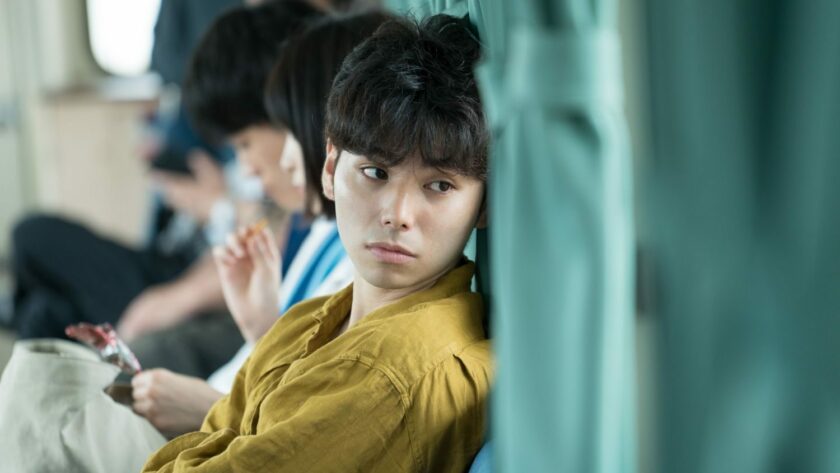Harry Mizumoto explores the tragic love story that unfolds across rural Japan.
Trigger warnings for mentions of rape and sexual assault.
I’ll admit, I was drawn in by the title. What can I say? As someone with relatively little experience with films, I fell prey to the assumption that a French title represents drama and sophistication. Watching Soirée, I can tell this is also the impression the director wanted to give — an unflinching, affecting drama. Sadly, the film misses the mark.
Soirée (ソワレ) centres struggling and morally bankrupt actor Shouta (Nijiro Murakami) who accompanies his acting troupe to visit a care home back in his hometown in Wakayama prefecture. There, he crosses paths with a quiet woman who works at the care home, Takara (Haruka Imou), who clearly carries some trauma regarding her past. The contrast between them is immediately felt: the first shot of Shouta scamming an elderly woman into entrusting him with her money is set against a later scene of Takara caring for the same woman, humming as she combs her white, white hair. Takara’s instinct to protect and care for the elderly indicates her displacement as a victim of childhood abuse, a trauma which the loosening threads of her life threaten to revive. Pricks of trouble are strewn throughout the beginning of the film — a notice of a convict’s release, panic attacks, a telling shot of two figures at the beach — culminating in the ‘surprise’ visit of Takara’s father at her apartment. After an unsuspecting Shouta drops by to pick up Takara for a summer festival, he encounters her being violently assaulted. One tussle and stabbing later, Takara and Shouta flee the scene. In a story of escape and rebirth, the two characters reflect how one can move past trauma to learn how to live.

Or so it seems. Often, Soirée feels like a puzzle with missing pieces. Characters fall in and out of the film; the pacing shudders and falls into contrived points which stretch the audience’s belief increasingly thin. It’s difficult to sympathize with the pair’s plight when we’re left asking: why are they running in the first place? Even worse, the film treads deeply into the cliché of using female suffering as a crutch for male character growth. Takara is a knot of suffering. Her name — meaning ‘treasure’ — is made laughably ironic as she continually wilts, collapses, or crumples to the floor, pushed by people or circumstances outside of her control. Her reticence as a sexual assault victim means that what is done to her body is what speaks the loudest, a compression which foreshadows her later act of sacrifice for Shouta’s freedom and emotional catharsis. Takara is just one in a long series of female characters for whom graphic sexual violence is used as a tool for audience sympathy. The fact that Soirée fails to define Takara past her sexual abuse is perhaps indicative of the persistence of rape culture in Japan today.
On the other hand, due to the film’s reliance on Takara’s trauma to give it weight, Shouta is too underdeveloped to balance her character out. Though it is hinted, through brooding shots and fits of unprovoked rage, that something is feeding on him, it’s never made clear what exactly that is. This leaves him unsympathetic and unnecessarily enigmatic: it is borderline incomprehensible to see him spouting wide-eyed wisdom to Takara in one scene, and raging at her in the next. The film’s later suggestion that Takara’s childhood abuse is somehow equivalent to Shouta’s shame and dwindling success as an actor — however slight — leaves a bad taste in the mouth long after the film’s conclusion.
These shortcomings are all the more disappointing because Soirée is beautifully shot. The couple drifts across the Japanese countryside, running through fields of grass or empty buildings where summer leaves its imprint. The brutal realism of the film is mixed with flights of imagination as shadows dance or Takara’s despair leads to fantastical visions of what could have been. Murakami and Imou both give brilliant performances despite the limitations of the script, switching seamlessly between Hyōjyungo and the native Kansai dialect. The best scene of the film sees the pair in a coin laundry, where Takara waltzes through in glitzy clothing and dreams of another life. It’s a spark of hope which is quickly extinguished, the rest of the film seeing her grow smaller and smaller. Though the film’s ending is meant to be hopeful, the sight of Takara’s retreating back left me feeling melancholy, and not in a good way. The name Soirée is fitting for the impression the film gives: an evening performance, and nothing more.




